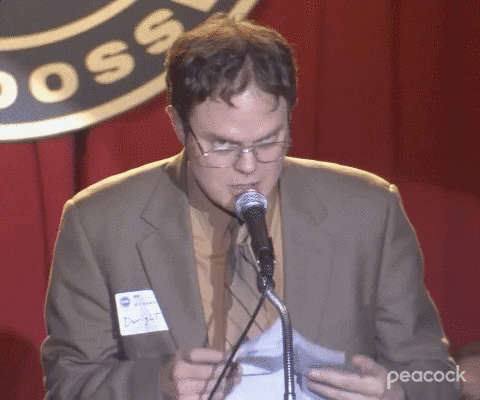Use discomfort to your advantage
Plus, how heat exposure affects learning
“Shame is an emotional glue trap that keeps us stuck in our financial behaviors.” — Financial psychologist Brad Klontz
BRAIN WAVES
Creature discomforts. Are people more afraid of public speaking than death? That’s debatable, but the fact that it’s even a question tells you how much people hate public speaking. And why shouldn’t they? It’s uncomfortable! But Kaitlin Woolley of the Cornell SC Johnson College of Business says we can use this sort of discomfort to our advantage. “Rather than perceive discomfort as a cue to stop goal pursuit, reframing it as a sign of progress helps people persist in difficult goals,” she told Psypost. Woolley and her colleagues conducted a study on several hundred improv students at Chicago’s Second City theater. During one improv exercise, one student had to walk around the room and “focus” while the other students were frozen. Some students were encouraged to feel awkward – their discomfort was a sign the exercise was working. Those students focused for longer periods of time and were able to come up with an improv response that was out of the ordinary, compared to students who weren’t encouraged to feel awkward. Woolley said: “Our research finds that people can harness discomfort … to motivate themselves to achieve important goals. So while personal growth is sometimes uncomfortable, we find that embracing discomfort can be motivating.” Something to remember next time you’re in front of a crowd.
Heat wave. We know that weather can influence behavior (see one of our favorite study titles for reference). It also changes the way we think. Researchers recently found a link between academic performance and heat exposure. In their study, students had lower test scores during a hot school year compared to a cool one. The study also found that low-income and minority students were impacted by heat more than others. “We provide the first evidence that cumulative heat exposure inhibits cognitive skill development and that school air conditioning can mitigate this effect,” the study reported. The solution? “Moving from a school with no air-conditioned classrooms to a school with all air-conditioned classrooms reduces the impact by approximately 78 percent.”
Love and marriage. When did marriage become so hard? Long-term relationships have changed over time. Maybe we can improve marriage by asking less of it. Listen to learn more.
ON THE HIDDEN BRAIN PODCAST
May 2: Psychologist Brad Klontz studies the thoughts, attitudes, and beliefs that people have about money; he calls them "money scripts." He says that once we understand the underlying scripts that shape how we spend and save, we can transform the way we think about our finances.
ON THE MY UNSUNG HERO PODCAST
Teachers are the ultimate unsung heroes! All week, for #TeacherAppreciationWeek, we're sharing stories about educators who made a powerful impact on the lives of their students.
May 3: Thirteen-year-old Lila Hoffa recalls the teacher who helped her bring her stories to life.
May 4: "I remember him saying, 'I know you don't think you're important enough for somebody to care about this, but you are important enough.'" Professor Azim Shariff remembers his tenth-grade English teacher, Daryl Wakeham.
May 5: "I'd never heard anybody challenge me with that kind of thing in my whole life." Tony Ludlow remembers his eighth-grade English teacher, Mrs. Holman.
May 6: Annika Kahn reunites with her favorite teacher from high school, 97-year-old Flossie Lewis.
Don’t forget to send us the story of your unsung hero! Record a voice memo on your phone and email it to myunsunghero@hiddenbrain.org.
MIND GAMES
It's 3:35. If the clock is rotated 90 degrees counterclockwise, what time will it be?
LAST WEEK’S PUZZLE
During which month do people sleep the least?
The answer: February (there are usually fewer nights in February).
FROM THE TWITTERATI…
A MOMENT OF JOY
Have an idea for Hidden Brain? A story you want to share with us? Send an email to ideas@hiddenbrain.org. And if you’d like to support our work, you can do so here. Listen to us on Spotify, Apple, Amazon Music or your favorite podcast platform.





